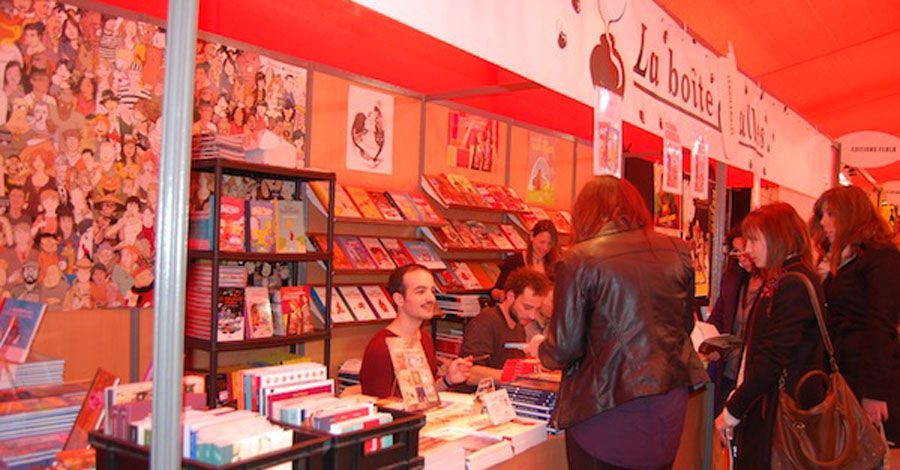It's all over now but the voting. After a whirlwind of controversy, commentary and boycotts, the organizers of the Angouleme International Comics Festival withdrew their all-male slate of nominees for the Grand Prix, the festival's top prize (and one of the most prestigious awards in all of comics) and said the voters could choose anyone they want. All creators who publish works in France are eligible to vote
Franck Bondoux, the festival's executive director, published a "mea culpa" in the French newspaper Le Monde, calling the omission of women from the list of nominees a "symbolic error." He accused the media of confusing the Grand Prix, which looks at 10 years or more of a creator's work, with the festival's book awards, which recognize graphic novels published in the past year. In that regard, the festival is ahead of its time, he maintained, as 25 percent of the nominated books are by women, who only make up 13 percent of creators in France, and women are well represented in the festival's exhibits and book awards.
But then he doubled down on the "no women in comics history" argument:
Without claiming to be an expert, it is difficult to deny that at least in the history of Franco-Belgian comics after the War (and until the last 10 or 15 years) women have largely been the minority. You just have to look through the pages of the magazines, the true generational markers, Tintin, Spirou, Pilote, Pif, A Suivre... to have proof.
While there may not have been a lot of women creators in magazines like Tintin and Spirou (Joann Sfar wrote about the deliberate exclusion of women during and after the war in his article rejecting his nomination), Angouleme calls itself an international comics festival, and the last two Grand Prix winners have been American (Bill Watterson) and Japanese (Katsuhiro Otomo). In fact, the method of choosing the Grand Prix has been changed over the past two years to make it less parochial; previously, the award was chosen by the earlier Grand Prix winners, now all comics creators published in France are eligible to vote. So, setting aside the fact that there have indeed been women making French-language comics in the past 10 years (the look-back period Bondoux suggests earlier in his column), he is also ignoring the large cadre of women creators in Japan, the U.S., and other countries, who have been making comics for decades.
Indeed, Florence Cestac, the only woman to receive the Gran Prix (so far) called Bondoux "a total idiot" in an interview with the French paper Journal du Dimanche. She criticized the festival itself as nothing more than a business, and, she said, "The organizers of the festival do not know their subject. ... There are plenty of female creators in my generation and the following generation who amply deserve the Grand Prix."
Sexism doesn't stop with creators but extends to the characters in BDs, who are often drawn as male fantasies, Cestac said. "People often told me that I didn't have a feminine style, that my women [characters] weren't feminine enough," she said. "By winning the Grand Prix in 2005, I proved them wrong. I prefer to laugh about it, but at the time it was shocking."
Bondoux fired back at Cestac in an interview in the same paper, saying, "What bothers me about what Florence Cestac said is not that she called me a idiot but that she said there is nothing cultural about the festival. That is insulting to the festival organizers, artists, and publishers and damaging to the international festival. ... Challenging creative choices is part of the game, but to say that the Mecca of great artists of the world is not cultural ..." (Apparently this left Bondoux speechless, as he didn't finish the sentence.)
"Everything is back to normal: The guys are in control," proclaimed Julie Maroh, creator of Blue is the Warmest Color, in an article in the French edition of Slate. Maroh, a member of BD Egalite, pointed out that although her group had called for the boycott, the press focused on the "great authors," i.e., the men who were nominated and withdrew their names from the list. When women raise an issue, she said, they are passed off as pains in the neck (or worse), but when men take their part, they are portrayed as knights in shining armor. "Feminism needs everybody," she wrote. "I would greatly prefer to see men join our cause than shrug their shoulders."
Nonetheless, she sees the way the Angouleme debacle played out as an example of what she calls "social cryptomnesia": Reforms called for by a minority group are adopted by society as a whole while keeping the original minority at a distance — in this case, because the loudest voices were those of men.
Of course Bondoux's statement that women are newcomers to the field spurred a flurry of articles to the contrary. In The Guardian, Laurenn McCubbin provides a concise history of women in comics, and Matt Thorn offers his insights into the Japanese manga industry, where women have been making comics for decades; he names some names but gave up on making a list of all the women who had won major awards when he got to 140 creators.

